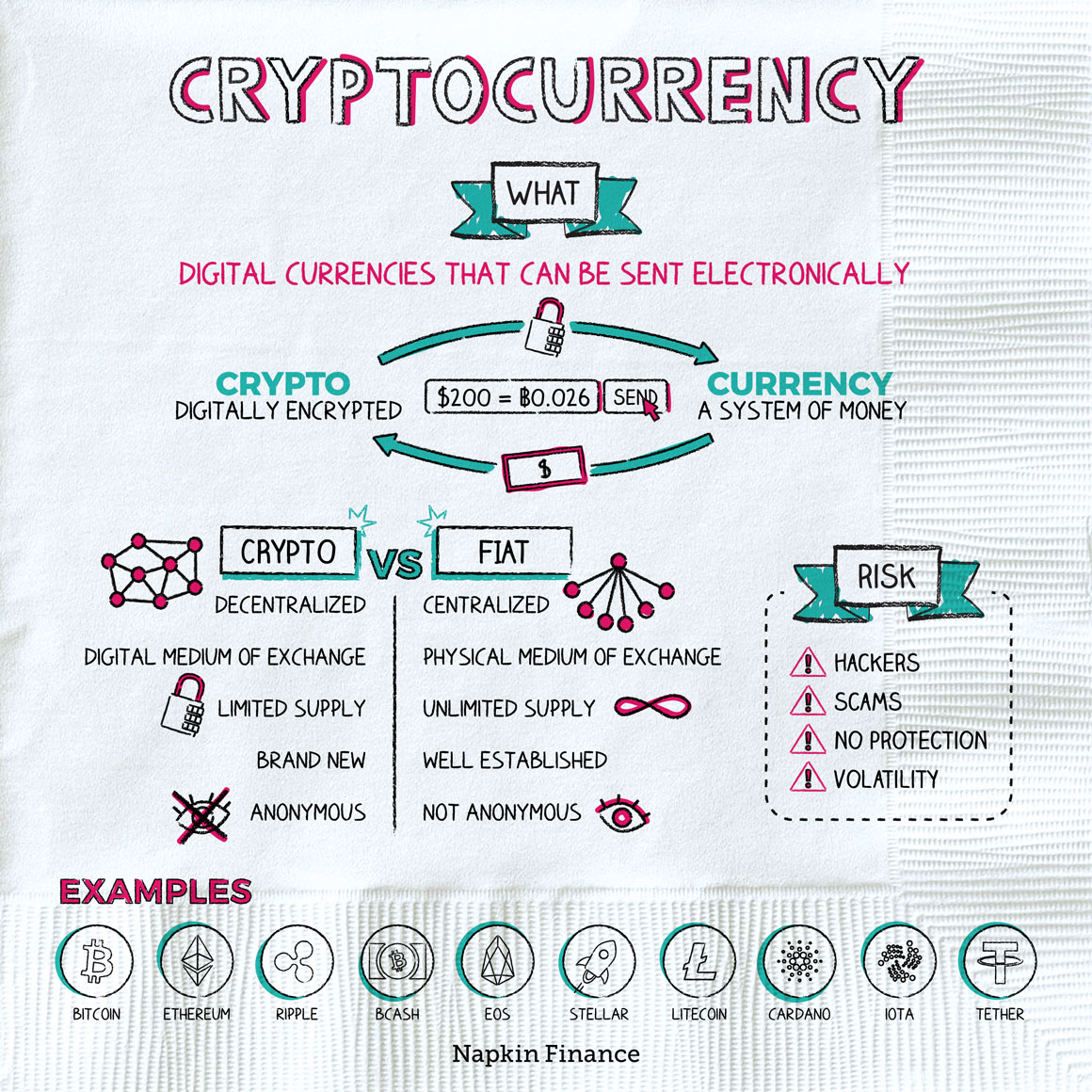Cryptocurrency
Tales of the Crypto
Cryptocurrency is digital money that can be sent electronically anywhere in the world.
Cryptocurrency is a system that relies on sophisticated encryption (hence the name) and a network of online users to function—compared with traditional currency, which is backed by a government. Here is what that difference really means:
| Crypto | Fiat/traditional |
| Decentralized—no one person, government, or corporation controls cryptocurrency. | Centralized—traditional currencies are issued and regulated by government entities. |
| Digital—cryptocurrency only exists online and can only be traded online (although some companies will happily sell you souvenirs they describe as physical Bitcoins). | Physical—traditional money can exist digitally, as in your bank account, but can also exist as physical bills and coins. |
| Limited supply—crypto is typically created with a finite supply. That could help it hold its value over time. | Unlimited supply—governments can always print more money, which can make fiat currency lose value to inflation. |
| Anonymous—crypto transactions can’t be traced back to real humans. | Not anonymous—traditional transactions generally can be tracked. |
| Brand new—the first cryptocurrency, Bitcoin, was launched in 2009. | Well established—mainstream currency has been around for eons. |
Cryptocurrency is maintained by computer networks scattered across the globe that record each purchase, sale, or trade on a public database called a blockchain. The blockchain is essentially a secure online spreadsheet that shows transactions.
For an established currency, such as Bitcoin or Ethereum, investors typically buy units through online marketplaces called exchanges. You can use a credit or debit card or an ACH payment from a bank account to purchase the currency.
Cryptocurrency can also be obtained through “mining”—a high-tech process in which “miners” solve math problems and get rewarded with new currency units—or by exchanging other digital currencies. Once you receive cryptocurrency units, you store them in software called a digital wallet.
Bitcoin was the first cryptocurrency to launch and remains the most popular, but there are thousands of different cryptocurrencies available today. Among the most popular cryptocurrencies (as measured by total value) are:
- Bitcoin
- Ethereum
- Tether
- XRP
- Bitcoin Cash
- Bitcoin SV
- Litecoin
- Binance Coin
- EOS
- Tezos
Cryptocurrency is an exciting but controversial part of the world of finance.
Some investors have become millionaires almost overnight as the currencies have taken off in value. But with the potential for great returns comes the possibility of great losses. The risks of investing in cryptocurrency include:
- Hackers—Digital wallets can be vulnerable to hacking.
- Scams—Fraudsters may advertise a fake new cryptocurrency and then disappear overnight.
- No protection—If your crypto disappears or goes to $0 tomorrow, there may not be anything you can do.
- Volatility—Cryptocurrency prices can swing from $0 to the thousands and back again in the blink of an eye. They make the stock market look tame.
“Virtual currencies… may hold long-term promise,
particularly if the innovations promote a faster, more secure,
more efficient payment system.“—Ben Bernanke
Cryptocurrency is digital money that runs on a worldwide computer network. Unlike traditional currency, cryptocurrency exists only online and isn’t controlled by governments or banks. Enthusiasts like that cryptocurrencies are secure and anonymous, and aren’t controlled by any centralized entity. Skeptics say that the currencies are highly speculative and could end up worthless.
- More than 2,000 types of cryptocurrency existed as of 2020, with a total combined value of more than $250 billion.
- Newly minted cryptomillionaires have something else in common: They love Magic: The Gathering cards. Prices of the highest-value Magic cards have jumped tenfold in recent years due to interest from cryptocurrency investors.
- Looking for another way to blow your cryptofortune? Try CryptoKitties—a Blockchain-based game for collecting and selling digital cats. A single CryptoKitty has sold for as much as $170,000.
- Cryptocurrency is digital money that exists online through a network of users.
- Unlike traditional currencies, crypto isn’t controlled by a central government or other entity.
- Investors can obtain cryptocurrency by buying units on exchanges, through a process called “mining,” or by trading them for other digital currencies.
- Some cryptocurrency investors have gotten rich quick, but there are major risks to investing.




